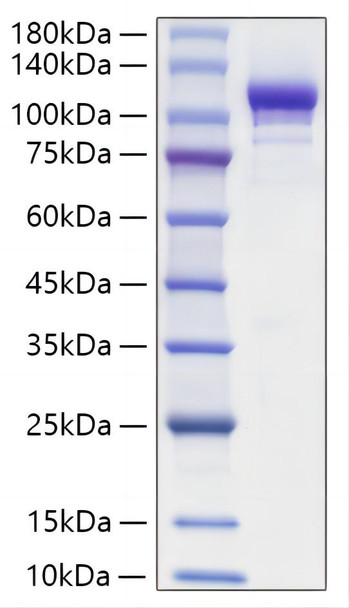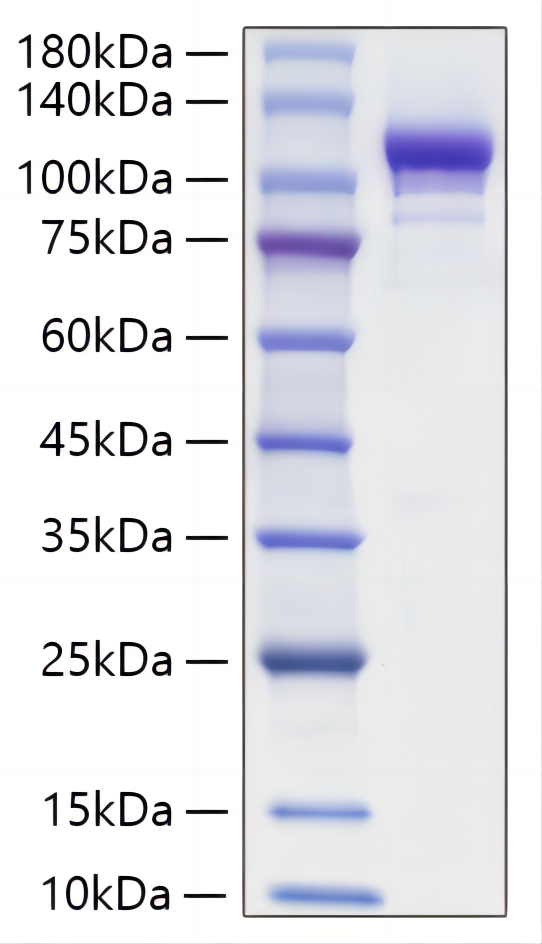Description
Recombinant Mouse Autotaxin/E-NPP2 Protein
The Recombinant Mouse Autotaxin/E-NPP2 Protein is a high-quality recombinant protein designed for murine biological research applications. This protein serves as an essential reagent in mouse model studies, comparative immunology research, and preclinical therapeutic evaluations, enabling scientists to investigate Autotaxin/E-NPP2 biology and its relevance to human disease mechanisms through translational research approaches.
This product (SKU: RPCB1652) is produced using advanced expression systems and features a C-His tag for convenient detection and purification. The protein exhibits a calculated molecular weight of 94.40 kDa with an observed molecular weight of 100-130 kDa under denaturing conditions, achieving ≥ 95 % as determined by SDS-PAGE., ensuring exceptional quality and consistency for research applications.
Key Features
| High Purity by Affinity Chromatography | |
| Mammalian & Bacterial Expression Systems | |
| High lot-to-lot consistency via strict QC |
| Product Name: | Recombinant Mouse Autotaxin/E-NPP2 Protein |
| SKU: | RPCB1652 |
| Size: | 10 μg , 20 μg , 50 μg , 100 μg |
| Reactivity: | Mouse |
| Synonyms: | Ectonucleotide pyrophosphatase/phosphodiesterase family member 2, E-NPP 2, 3.1.4.39, Autotaxin, Extracellular lysophospholipase D, LysoPLD,Enpp2, Npps2, Pdnp2 |
| Tag: | C-His |
| Calculated MW: | 94.40 kDa |
| Observed MW: | 100-130 kDa |
| Gene ID: | 18606 |
| Protein Description: | High quality, high purity and low endotoxin recombinant Recombinant Mouse Autotaxin/E-NPP2 Protein (RPCB1652), tested reactivity in HEK293 cells and has been validated in SDS-PAGE.100% guaranteed. |
| Endotoxin: | < 0.1 EU/μg of the protein by LAL method. |
| Purity: | ≥ 95 % as determined by SDS-PAGE. |
| Formulation: | Lyophilized from a 0.22 μm filtered solution of 20mM Tris,150mM NaCl,pH7.4 |
| Reconstitution: | Centrifuge the vial before opening. Reconstitute to a concentration of 0.1-0.5 mg/mL in sterile distilled water. Avoid vortex or vigorously pipetting the protein. For long term storage, it is recommended to add a carrier protein or stablizer (e.g. 0.1% BSA, 5% HSA, 10% FBS or 5% Trehalose), and aliquot the reconstituted protein solution to minimize free-thaw cycles. |
| Storage: | Store at -20℃.Store the lyophilized protein at -20℃ to -80 ℃ up to 1 year from the date of receipt. After reconstitution, the protein solution is stable at -20℃ for 3 months, at 2-8℃ for up to 1 week. |
ENPP-2, also known as Autotaxin, belongs to the ectonucleotide pyrophosphatase/phosphodiesterase (NPP) family. Some NPPs hydrolyze phosphates from nucleotides and their derivatives. ENPP-2 shares 40 - 50% identity to ENPP1 & 3, all of which contain a N-terminal intracellular domain, a single transmembrane domain and a large extracellular domain that includes a catalytic domain, two somatomedin-B-like domains, and a C-terminal nuclease-like domain. Unlike ENPP-1 and ENPP-3, ENPP-2 has weak activity against nucleotides, but exhibits a lysophospholipase D activity which allows the formation of lysophosphatidic acid (LPA) and choline from lysophosphatidylcholine. The hydrolysis of nucleotides and lysophospholipids by ENPP-2 is mediated by a single catalytic site. Evidence shows LPA and sphingosine 1-phosphate to be specific inhibitors of ENPP-2. ENPP-2 was originally found to stimulate tumor cell motility and has since been found to enhance tumor invasion and metastasis ( and to be up-regulated in several types of carcinomas including breast and lung.







